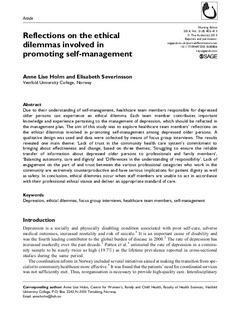Reflections on the ethical dilemmas involved in promoting self-management
Journal article, Peer reviewed
Published version
Permanent lenke
http://hdl.handle.net/11250/2452052Utgivelsesdato
2014Metadata
Vis full innførselSamlinger
Sammendrag
Due to their understanding of self-management, healthcare team members responsible for depressed older persons can experience an ethical dilemma. Each team member contributes important knowledge and experience pertaining to the management of depression, which should be reflected in the management plan. The aim of this study was to explore healthcare team members’ reflections on the ethical dilemmas involved in promoting self-management among depressed older persons. A qualitative design was used and data were collected by means of focus group interviews. The results revealed one main theme: ‘Lack of trust in the community health care system’s commitment to bringing about effectiveness and change, based on three hemes; ‘Struggling to ensure the reliable transfer of information about depressed older persons to professionals and family members’,‘Balancing autonomy, care and dignity’ and ‘Differences in the understanding of responsibility’. Lack of engagement on the part of and trust between the various professional categories who work in the community are extremely counterproductive and have serious implications for patient dignity as well as safety. In conclusion, ethical dilemmas occur when staff members are unable to act in accordance with their professional ethical stance and deliver an appropriate standard of care.

